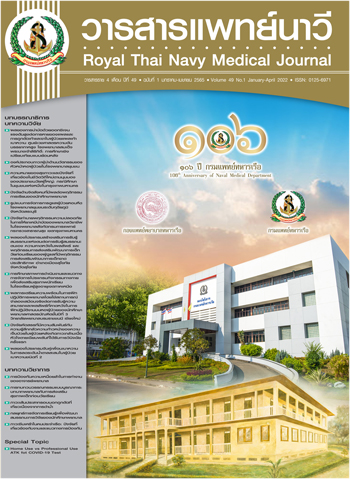ความหมายของสุขภาวะและปัจจัยที่เกี่ยวข้องในชีวิตวิถีใหม่ตามมุมมองของประชาชนวัยผู้ใหญ่: กรณีศึกษาในชุมชนแห่งหนึ่งในกรุงเทพมหานคร
Main Article Content
บทคัดย่อ
การวิจัยครั้งนี้เป็นการวิจัยเชิงคุณภาพมีวัตถุประสงค์เพื่อค้นหาการให้ความหมายคำว่าสุขภาวะ และปัจจัยที่เกี่ยวข้องกับสุขภาวะในชีวิตวิถีใหม่จากมุมมองของประชาชนวัยผู้ใหญ่ในชุมชนเมืองแห่งหนึ่งในกรุงเทพมหานคร ผู้ให้ข้อมูล ได้แก่ ประชาชนวัยผู้ใหญ่ที่อาศัยในชุมชนเมืองแห่งหนึ่งในกรุงเทพมหานครที่ได้รับการคัดเลือกแบบเจาะจง จำนวน 10 คน ดำเนินการเก็บข้อมูลด้วยการสนทนากลุ่มภายใต้มาตรการการป้องกันการแพร่ระบาดของไวรัส COVID-19 โดยมีเครื่องมือที่ใช้ในการเก็บข้อมูล คือ แบบสอบถามข้อมูลส่วนบุคคลและแบบสัมภาษณ์กึ่งโครงสร้าง ซึ่งมีค่าดัชนีความตรงตามเนื้อหาทั้งฉบับ เท่ากับ 1 วิเคราะห์ข้อมูลเชิงคุณภาพโดยวิเคราะห์เชิงเนื้อหา ผลการวิจัย พบว่า ผู้ให้ข้อมูลให้ความหมายของ “สุขภาวะ” ในยุคชีวิตวิถีใหม่ คือ “การมีสมดุลชีวิตที่มีความสุข” และปัจจัยที่เกี่ยวข้องกับสุขภาวะ คือ ความมีวินัยของตัวเอง การปรับตัวและเรียนรู้สิ่งใหม่ๆ การได้รับการยอมรับจากครอบครัว และความปลอดภัยในชุมชน จากผลการวิจัย หน่วยงานที่เกี่ยวข้องสามารถนำไปเป็นข้อมูลพื้นฐานในการจัดกิจกรรมเพื่อส่งเสริมให้ประชาชนมีสุขภาวะในยุคชีวิตวิถีใหม่ต่อไป
Article Details

อนุญาตภายใต้เงื่อนไข Creative Commons Attribution-NonCommercial-NoDerivatives 4.0 International License.
เอกสารอ้างอิง
World Health Organization. Who we are: constitution. [Internet]. [cited 2020 March 1]. Available from: https://www.who.int/about/who-we-are/constitution.
Campbell M, Gavett G. What Covid-19 has done to our well-being, in 12 charts. [cited 2021 May 22]. Available from: https://www.inspired-engagement.com/wp-content/uploads/What-Covid-19-Has-Done-to-Our-Well-Being-in-12-Charts.pdf.
Hartweg DL. Dorothea Orem’s self-care deficit nursing Theory. In: Smith MC, Parker ME. Nursing theories and nursing practice. [Internet]. 4th ed. Philadelphia: F.A. Davis Company; 2020. p. 105-32. [cited 2021 May 22]. Available from: https://search.credoreference.com/content/entry/fadaviswckz/dorothea_orem_s_self_care_deficit_nursing_theory/0.
Ochola EA, Karanja D, Elliott SJ. The impact of Neglected Tropical Diseases (NTDs) on health and wellbeing in Sub-Saharan Africa (SSA): a case study of Kenya. PLOS Neglected Tropical Diseases. [Internet]. [cited 2021 May 22]. Available from: https://doi.org/10.1371/journal.pntd.0009131.
Maragakis LL. The new normal and Coronavirus. [Internet]. [cited 2021 May 22]. Available from: https://www.hopkinsmedicine.org/health/conditions-and-diseases/coronavirus/coronavirus-new-normal.
Thai Health Promotion Foundation. Direction, goals and strategy 10-year period (2012-2021). [Internet]. [cited 2020 February 4]. Available from: http://resource.thaihealth.or.th/library/academic/13320. (in Thai).
Vijitsunthornkul K, Khumpai D, Charoendee K. Risk factors and risk behavior trends 2005-2015 survey of risk behavior to non-communication diseases and Injury: BRFSS. [Internet]. [cited 2020 February 4]. Available from: http://www.thaincd.com/document/file/info/brfss. (in Thai).
Beck A, Wustenberg T, Genauck A, Wrase J, Schlagenhauf F, Smolka MN, et al. Effect of brain structure, brain function, and brain connectivity on relapse in alcohol-dependent patients. Archives of General Psychiatry 2012;69(8):842-52.
Hfocus News Agency. Encourage Thais to reduce their behaviors to reduce the risk of premature death. [Internet]. [cited 2020 February 4]. Available from: https://www.hfocus.org/content/2019/02/16864. (in Thai).
Division of Non Communicable Diseases. Premature mortality data 5 NCDs death data. [Internet]. [cited 2021 April 4]. Available from: Index of /document/file/info/brfss (thaincd.com). (in Thai).
Srichan C. Take care of the mind during COVID-19: a positive reflection on a new normal life. [Internet]. [cited 2021 April 3]. Available from: wellness.chula.ac.th/?q=node/325. (in Thai).
Wongkampun S, Thiengtham V, Suwanumphai P. Socio-economic factors that affect the successful aging of the health of the elderly in the community, Bangkok. Journal of Public Health Nursing 2017;31(3):19-36. (in Thai).
Scott D, Happell B. The high prevalence of poor physical health and unhealthy lifestyle behaviors in individuals with severe mental illness. Mental Health Nursing 2011;32:589-97.
Andrew HM, Landon S, Elaine MH, Judy LS, Lindon JE. The relationship between education and mental health: new evidence from a discordant twin study. Social Forces 2016;95(1):107-31.
Larping U. A study of how to apply objects of sympathy to develop the elderly's social health in northern Thailand. Dhammatha Academic Journal 2018;18(2):233-43. (in Thai).
Phra Paisarn Visallo. True happiness with wisdom: the way to intellectual well-being. 3rd ed. Bangkok: Buddhist Network Press; 2010. (in Thai).
Dur K, Srivastava RK. A gender-based study on the impact of psychological wellbeing on academic performance of students. The IUP Journal of Organizational Behavior 2020;19(4):40-65.
Christopher F, Nuqui AV. Emergence of a situational leadership during COVID-19 pandemic called new normal leadership. IJAMR 2020;4(10):15-9.
Office of National Statistics. Population size and structure by age and gender and province 2019. [Internet]. [cited 2021 April 4]. Available from: http://statbbi.nso.go.th/staticreport/page/sector/th/01.aspx. (in Thai).
Ritchie J, Lewis J, Nicholls CM, Ormston R, editors. Qualitative research practice: a guide for social science students and researchers. Thousand Oaks, CA: Sage Publications; 2013.
Krippendorff K. Content analysis; an introduction to its methodology. Beverly Hills, CA: Sage Publications; 1980.
Govindasamy D, Ferrari G, Maruping K, Bodzo P, Mathews C, Seeley J. A qualitative enquiry into the meaning and experiences of wellbeing among young people living with and without HIV in KwaZulu-Natal, South Africa. Social Science & Medicine 2020; 258. [Internet]. [cited 2021 April 4 ]. Available from: https://www.sciencedirect.com/science/article/pii/S0277953620303221.
Cheng C, Wang H, Ebrahimi OV. Adjustment to a “new normal:” coping flexibility and mental health issues during the COVID-19 pandemic. Front Psychiatry 2021;12:626197.
Flimthailand. Adult development. [Internet]. [cited 2021 April 4]. Available from: https://flimthailand.wordpress.com/2015/05/26/พัฒนาการของวัยผู้ใหญ่/. (in Thai).
Espinosa PR, Chen Y, Sun C, You S, Lin J, Chen K, et al. Exploring health and well-being in Taiwan: what we can learn from individuals’narratives. BMC Public Health 2020;20(1):159. doi: 10.1186/s12889-020-8201-3.
Techsauce Team. 7 factors that will shape new normal. [Internet]. [cited 2021 May 22]. Available from: https://techsauce.co/news/7-factors-that-will-shape-new-normal. (in Thai).
Lekwong S, Lawang W, Rattanakrethakul S. Factors affecting the spiritual well-being among family caregivers of persons with physical disability. Journal of Phrapokklao Nursing College 2019;30(1):102-12. (in Thai).
Weeranakin P, Promphakping B. Local meanings of wellbeing and the construction of wellbeing Indicators. Soc Indic Res 2018;138:689-703.
Prakash IJ, Reddy MY, Menon G. Covid-19 and the ‘new normal’: a gerontological perspective. Indian Journal of Gerontology 2021;35(2):283-98.
Lanham NS, Bockelman KJ, Brendan J. Telemedicine and orthopaedic surgery the COVID-19 pandemic and our new normal. JBJS Rev 2020;8(7):e2000083. doi: 10.2106/JBJS.RVW.20.00083.


